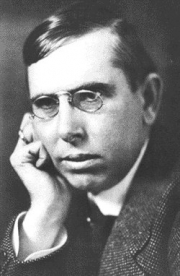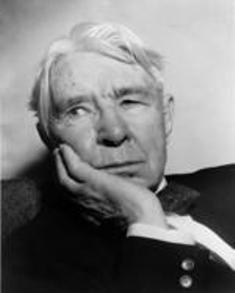
Eugenia Cheng
Born:
Connection to Illinois: Cheng currently lives in Chicago. Biography: Eugenia Cheng is the scientist in residence at the School of the Art Institute of Chicago and an Honorary Fellow at the University of Sheffield.
Awards:
Website: http://https://www.wsj.com/news/types/everyday-math
WorldCat: http://www.worldcat.org/search?q=Eugenia++Cheng
Selected Titles
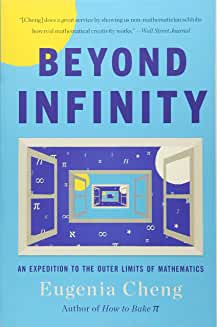 |
Beyond Infinity: An Expedition to the Outer Limits of Mathematics ISBN: 1541644131 OCLC: 975485516 Basic Books 2018 A mathematician and scientist in residence at the School of the Art Institute of Chicago helps readers explore the concept of infinity through unique concepts including chessboards, a chicken-sandwich sandwich and the creation of infinite cookies from an infinite dough ball.-- |
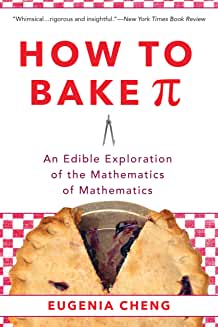 |
How to Bake Pi: An Edible Exploration of the Mathematics of Mathematics ISBN: 0465097677 OCLC: 893455136 Basic Books 2016 In How to Bake Pi, math professor Eugenia Cheng provides an accessible introduction to the logic and beauty of mathematics, powered, unexpectedly, by insights from the kitchen: we learn, for example, how the béchamel in a lasagna can be a lot like the number 5, and why making a good custard proves that math is easy but life is hard--Publisher information. |
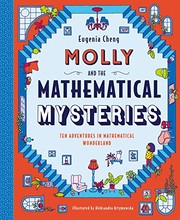 |
Molly and the mathematical mysteries / ISBN: 1536217107 OCLC: 1175676708 Join Molly as she ventures into a curious land where nothing is quite as it seems. A trail of clues leads from one mystery to another, but who is leaving them and where will they go? This interactive math book shows there's more to math than sums and numbers. This creative approach is sure to spark the imagination. |
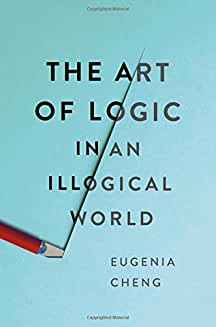 |
The Art of Logic in an Illogical World ISBN: 1541672488 OCLC: 1019991677 Basic Books 2018 In a world where fake news stories change election outcomes, has rationality become futile? In The Art of Logic in an Illogical World, Eugenia Cheng throws a lifeline to readers drowning in the illogic of contemporary life. Cheng is a mathematician, so she knows how to make an airtight argument. But even for her, logic sometimes falls prey to emotion, which is why she still fears flying and eats more cookies than she should. If a mathematician can't be logical, what are we to do? In this book, Cheng reveals the inner workings and limitations of logic, and explains why alogic--for example, emotion--is vital to how we think and communicate. Cheng shows us how to use logic and alogic together to navigate a world awash in bigotry, mansplaining, and manipulative memes. Insightful, useful, and funny, this essential book is for anyone who wants to think more clearly.--Amazon.com. |
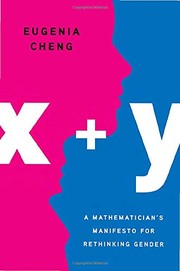 |
x + y : ISBN: 1541646509 OCLC: 1130660027 "Eugenia Cheng can't help thinking like a mathematician. She also can't help thinking like a woman. After all, she's both. But there seems like there must be a clear tension. She had to learn to be a mathematician, for one thing, and--in the popular imagination, anyway--mathematics seems very 'male,' the domain of individualistic geniuses with terrible social skills, pursuing university tenure and fame. Those traits, however, aren't really what it means to do math: as Cheng has shown through her three previous books, what it really means to think like a mathematician is to see past the distracting, superficial details of things to find their essences. When she turned that thinking upon gender, she found, there wasn't much essence to speak of at all. But what she did find there has become this book. At the heart of x + y are two concepts: not masculine or feminine, but what Cheng calls ingressive and congressive personalities. Ingressive people are competitive, independent, bold, risk-taking, self-assured, and often have one-track minds: these are the people Cheng worked with in high finance, the sort of people who might do well as surgeons or daredevils. Congressive people, on the other hand, focus on society and community, take the needs of others into account, emphasize interconnectedness, and tend to collaborate. As a society, we associate ingressive personalities with men and congressive personalities with women. And herein lies the problem--the source not just of gender inequality, but a great deal of individual unhappiness. When a mathematician like Cheng pursues the issue abstractly, she finds nothing uniquely male about ingression or female about congression. But she does find that, from standardized exams to Nobel prizes, society fundamentally rewards the ingressive, thereby forcing many people--including Cheng herself, once upon a time--to learn and practice a suite of behaviors that they might not have otherwise. To Cheng, it would be a failure to think that a bunch of bad-ass female CEOs would represent true progress, or that the world will be better when men get in touch with their feminine side, because both those scenarios are predicated on faulty premises and bad abstractions. x + y is a call to action, offering a vision of how we can use the power of abstraction to make the world less competitive, that is, more congressive, and to solve gender inequality, not by encouraging men to be less aggressive, or women to be more, but by realizing that--once you start thinking about the problem like a mathematician--it becomes clear that most of what we ascribe to gender has nothing to do with gender at all"-- |


